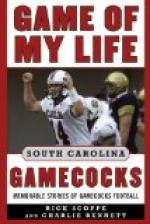My father was not a field hand; my first recollection of him was that he used to take care of hogs and cows in the swamp, and when too old for that work he was sent to the plantation to take care of horses and mules, as master had a great many for the use of his farm.
I have stated that father said that his father’s name in Africa was Moncoso, and his mother’s Mongomo, but I never learned what name he went by before he was brought to this country. I only know that he stated that Col. Dick Singleton gave him the name of William, by which he was known up to the day of his death. Father had a surname, Stroyer, which he could not use in public, as the surname Stroyer would be against the law; he was known only by the name of William Singleton, because that was his master’s name. So the title Stroyer was forbidden him, and could be used only by his children after the emancipation of the slaves.
There were two reasons given by the slave holders why they did not allow a slave to use his own name, but rather that of the master. The first was that, if he ran away, he would not be so easily detected by using his own name as by that of his master. The second was that to allow him to use his own name would be sharing an honor which was due only to his master, and that would be too much for a negro, said they, who was nothing more than a servant. So it was held as a crime for a slave to be caught using his own name, a crime which would expose him to severe punishment. But thanks be to God that those days have passed, and we now live under the sun of liberty.
MOTHER.
Mother’s name was Chloe. She belonged to Col. M.R. Singleton too; she was a field hand, and never was sold, but her parents were once.
Mr. Crough who, as I have said had owned this plantation on which mother lived, had sold the plantation to Col. Dick Singleton, with mother’s parents on it, before she was born.
Most of the family from which mother came, had trades of some kind; some were carpenters, some were blacksmiths, some house servants, and others were made drivers over the other negroes. Of course the negro drivers would be under a white man, who was called the overseer. Sometimes the negro drivers were a great deal worse to their fellow negroes than were the white men.
Mother had an uncle by the name of Esau, whom master thought more of than he did of the overseer. Uncle Esau was more cruel than was any white man master ever had on his plantation. Many of the slaves used to run away from him into the woods. I have known some of the negroes to run away from the cruel treatment of Uncle Esau, and to stay off eight or ten months. They were so afraid of him that they used to say that they would rather see the devil than to see him; they were glad when he died. But while so much was said of Uncle Esau, which was also true of many other negro drivers, the overseers themselves were not guiltless of cruelty to the defenceless slaves.




